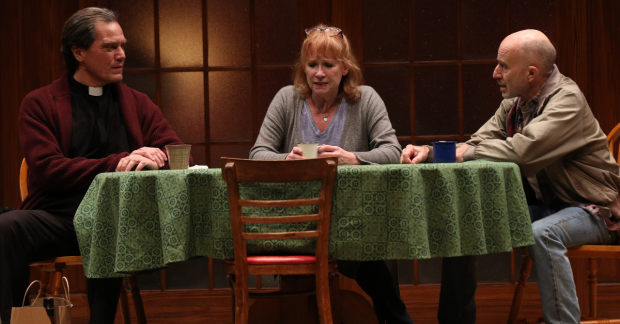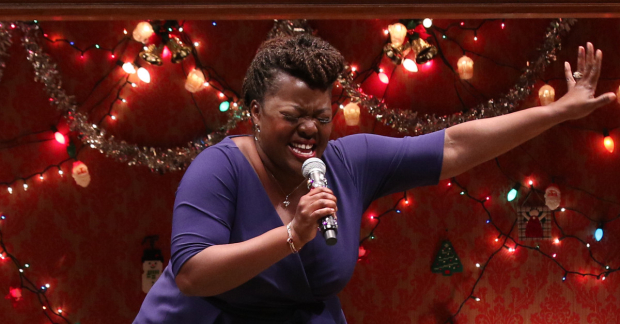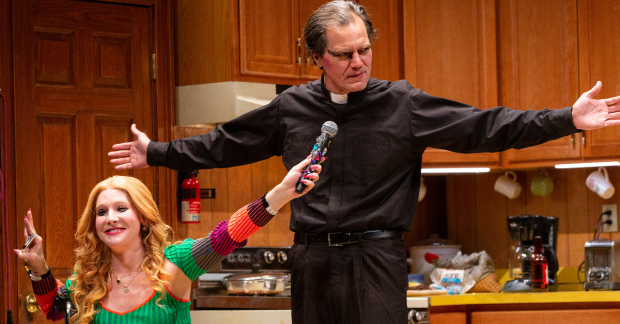Review: Denis Johnson's Des Moines Is America in Microcosm — or Is It?
The late author’s final play gets the all-star treatment in a TFANA production.

(© Gerry Goodstein)
"I just prefer actual butter from a cow," says Dan (Arliss Howard), a 60-something cab driver whose wife, Marta (Johanna Day), has tricked him into eating margarine before and seems to be trying to do it again. "Butter comes from cows, and this stuff comes from oil wells." Sometimes in life it's hard to know what you're getting.
So it is with Denis Johnson's Des Moines, a perplexing play now running at the Polonsky Shakespeare Center. The work was first produced in San Francisco in 2007, and in 2013 it started undergoing readings and workshops with Theatre for a New Audience. Despite pleas from TFANA's founding artistic director Jeffrey Horowitz, Johnson refused to elucidate some of its abstruse plots points and themes, and declared the play finished before his death in 2015.
TFANA's production of this quirky comedy boasts a top-notch cast, with Howard and Day joined by Michael Shannon, Heather Alicia Simms, and Hari Nef, so at least we know there are fine actors involved. We also know that esteemed director Arin Arbus is helming, so that's reassuring.

(© Gerry Goodstein)
Less certain is what Des Moines is actually about. On its surface it deals with a white middle-aged married couple living on the second floor of a two-story building in Des Moines, Iowa (scenic designer Riccardo Hernández impressively exposes the depths beneath the stage to create the illusion of an upper apartment). Their granddaughter (Nef, decked out in sparkling boots by Qween Jean) lost the use of her legs during a botched sex-change operation and is now confined to a wheelchair.
But that's not what's troubling Dan. He's bothered by having seen their family friend Father Michael (Shannon) outside a gay bar wearing lipstick. He's also thinking about a Black man he drove to the airport who was soon after killed in a plane crash. The man's wife, Mrs. Drinkwater (Simms), unexpectedly shows up at the house to take care of some business involving her husband's lost wedding ring, while Father Mike is sitting at the kitchen making Depth Charges (beer with shots of amaro dropped in) for everyone.
Of course, with the booze flowing like the river Jordan, can it be long before the whole gang gets drunk, starts singing karaoke, and collapses into a bacchanalian orgy? (Fight director J. David Brimmer's skills come into play here.)
As I witnessed these events transpire onstage, I couldn't help thinking that I was watching some high-octane Sam Shepard play. I also couldn't help thinking that, confused as I was, I wasn't bored at any time during the play's one hour and 40 minutes. I suspect this was due less to the play itself than to the strength of the performances, all of which end up being as hilarious as they are absurd.

(© Travis Emery Hackett)
Howard and Day are well matched as a clueless working-class white couple who leave their Christmas decorations up year-round and seem shell-shocked by all the changes that are happening in the world and in the demographics of their city. "I hardly recognized the old neighborhood," says Father Mike. "They're widening the bridge, I guess," replies Dan.
Shannon for his part steals the stage as the equally muddle-headed priest who gets a questionable makeover by Nef's Jimmy. Both of them belt out some karaoke numbers (Nef sings Johnny Cash's "Folsom Prison Blues" followed by Shannon's impressive rendition of Elvis's "Love Me Tender") that have a comfortingly hypnotic effect amid all the drunken madness (sound designer Mikaal Sulaiman amplifies everyone's voices with a karaoke-mic graininess). Then Simms vamps things up when she stands on the kitchen table and sings "Kansas City" like a lounge singer while Marta cheers her on with some startlingly offensive language.
Did I mention some of this may or may not be a dream?
Johnson seems to have intended to leave all such explanations out and let us try to put together what this confusion signifies — or doesn't. In the end there is a kind of cohesion to the play if one steps back and looks at these five characters as somehow representing the apex of America's anomie. But you're likely to have lots of questions that go unanswered as you exit the theater. "What does 'Des Moines' mean?" asks Mrs. Drinkwater as she muses boozily into her cup. Alas, she doesn't get an answer, either.










